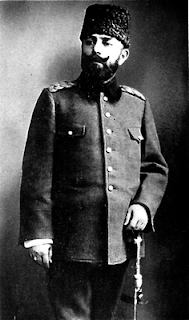Turkey
today called a meeting of NATO member states to discuss its response to the
shooting down of one of its fighter jets by Syria on Friday.
 |
| Djemal Pasha (from Wikipedia) |
Ankara invoked Article 4
of NATO's charter, under which consultations can be requested when an ally
feels their security is threatened. But the move also signals that, for now, Ankara
is looking for a concerted diplomatic response rather than taking
military action of its own.
Earlier, Turkey's foreign
minister said the F-4 Phantom was in
international airspace when it was hit.
Ahmet Davutoglu said the
unarmed plane was not on a reconnaissance or secret mission related to Syria,
but had mistakenly breezed in and out of Syrian airspace a quarter of an hour before
the incident.
In an interview with TRT
television, Davutoglu stressed the unarmed jet had briefly entered Syrian
airspace by mistake on Friday but had left by the time it was shot down several
minutes later.
“Our plane shortly
violated Syrian airspace, but not at the time it was shot down,” he said.
"According to our
conclusions, our plane was shot down in international airspace, 13 nautical
miles (24km) from Syria," he said.
Davutoglu also insisted the
jet had not been on a "covert mission related to Syria" but had
instead been carrying out a training flight to test Turkey's radar
capabilities.
The unarmed F-4 Phantom
was not sending hostile signals, and identifiable as Turkish, he said.
"You have to first
send a caution, a warning," he said in the first detailed Turkish
statement on the international incident. "If the warning doesn't work, you
scramble your planes, you send a stronger signal, you force the plane to land.
There wasn't enough time to do any of that in the time our plane was in Syrian
airspace."
"We have to
question how it is that an unarmed, solo flight got this response from the
Syrians," he said.
He also said Turkish
intelligence intercepted radio communications from the Syrian side suggesting
that they knew it was a Turkish plane.
Davutoglu said
Turkey's response will be clear after Prime Minister Recep Tayyip Erdogan's
scheduled meeting with opposition leaders later today. “We will, without any
hesitation, decisively take the necessary steps regarding the Turkish plane
downed by Syria,” he added.
This
is an unusual move that raised speculation about a possible parliamentary
decision, which is a requirement for any military action out of the country according
to the Turkish Constitution. “We are not considering military action now,” a
source told Turkey’s Hurriyet Daily News. “But we want to inform the opposition
and we want to keep all options open.”
In
his daily
column for Saudi Asharq Alawsat, Egyptian
political analyst and talk show host Imad Adeeb quotes an unnamed Turkey expert
as giving four reasons why Ankara’s response to Friday’s plane incident will be
all bark but no bite.
The
four reasons are:
(1)
Relations between the Turkish military and the ruling Justice and Development Party (AK Party) of President Abdullah Gul and Erdogan are stretched and the
military are opposed to any impetuous escalation.
(2) Military escalation against Syria would help the regime’s political
floatation. Fact is that an external military threat usually shores up a regime
swimming in troubled waters by rallying citizens around it.
(3) A Turkish military blitz would destroy Turkey’s so-called
“zero problem” foreign policy and evoke memories of the Ottoman Empire and of Djemal Pasha, who
was appointed with full powers in military and civilian affairs in Syria in
1915.
(4)
The regional reactions of Iran and Hezbollah and trade relations with Russia
and China give Ankara cause for concern.
Accordingly,
“You can expect Ankara to talk tough politically and take retaliatory political
measures. But it will choose to pass up a military riposte as it did in the
case of the Israeli
naval commando raid” on a Turkish boat
in the 2010 Gaza Freedom Flotilla.
“Turkey
will be making a lost of noise, but the maximum it will do is increase its
military assistance to the Syrian opposition.”
